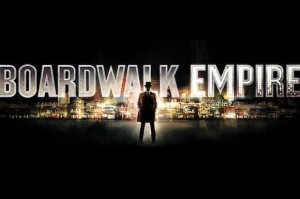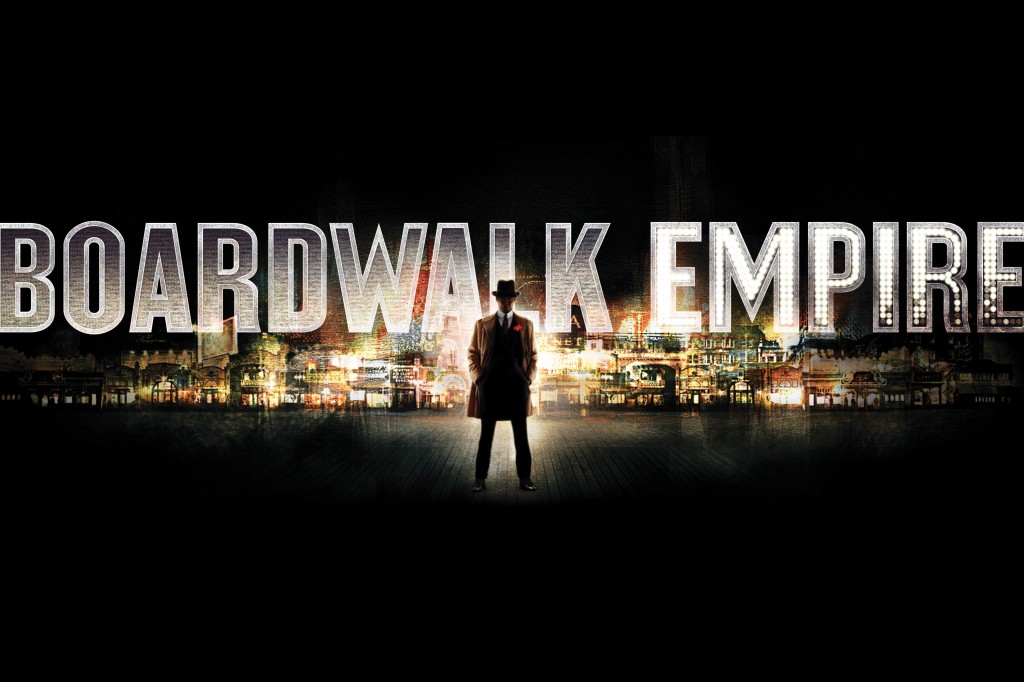Our favorite Prohibition era gangster show has ended, and what better way to pay homage than with a last round-up of our favorite words?
While you’re at it, check out our Boardwalk Empire glossary from last year.
agony aunt
Psychiatric patient [to Gillian]: “I do love a bit of the agony aunt, don’t you?”
“The Good Listener,” September 14, 2014
Agony aunt is such a great term — too bad it’s from the 1970s. While advice columns have been around since at least 1690, this particular phrase referring to a presumably female newspaper advice columnist wasn’t coined until 1972, according to Oxford English Dictionary (OED). This episode takes place in 1931.
Agony uncle, a male advice columnist, was coined in 1981.
Big Boy
Eli: “We came to rob the joint? . . .We knew the Big Boy would be out.”
“Devil You Know,” October 12, 2014
Big Boy was just one of many nicknames of gangster Al Capone. Among others were the Beast, the Behemoth, Big Al, the Big Fellow, the Big Guy, Al Brown, Tony Scarface, and Snorky.
This Vanity Fair article from 1931 also refers to Capone as Big Boy:
[Capone] is acknowledged to be an enlightened employer. His are the happiest, best-fed and most contented machinegun-chuggers in Chicago. . . .The Big Boy pays them well and does everything to make them comfortable.
Where this nickname comes from is unclear.
hock
Charlie Luciano: “I told you to be careful.”
Bugsy Siegel: “I got a bullet in my leg. You gonna hock me now?”
“Friendless Child,” October 19, 2014
Hock is a Yiddish word meaning to bother, pester, or annoy incessantly. It comes from the expression hak mir nisht ken tshaynik, or “don’t hock a teakettle at me.”
A variant seems to be hack, says the OED, meaning “to embarrass, annoy; to disconcert, confuse.”
UPDATE: Wordsmith Nancy Friedman, aka Fritinancy, just let us know that hock actually translates from Yiddish as “hit” or “knock,” and the Yiddish expression above means “don’t hit a teakettle,” or make noise. The figurative meaning seems to be to bother or annoy. Thanks, Nancy!
Jersey devil
Nucky: “Next time it’ll be the Jersey devil.”
Sheriff: “She is the Jersey devil.”
“King of Norway,” October 5, 2014
While we couldn’t find a first citation for this creepy creature of the Pine Barrens, the name seems to have originated in the early 18th century — not, however, as “a monster of the woods,” says historian Brian Regal, “but of politics.”
Originally known as the Leeds Devil, the cloven-hoofed one was named for the family Leeds, whose patriarch, Daniel, arrived in America in 1677. Daniel was dubbed “evil” and “Satan’s Harbinger” by Quakers offended by the inclusion of astrology in an almanac Leeds published in 1687 and for satirizing them in later books.
In the mid-18th century, the Leeds were targeted for having “sided with the empire” (Daniel had been a fan of Lord Cornbury, the first royal governor of New Jersey) and for “somehow being in the occult,” says Regal. By the time Revolutionary War rolled around, “the ‘Leeds Devil’ stood as a symbol of political ridicule and scorn.”
In the early 1900s, the Philadelphia Dime Museum claimed to have the legendary monster on display (in reality, a kangaroo with wings attached).
Somewhere along the way, the Leeds Devil became the Jersey devil, although it’s not clear when. The earliest citation we could find was from 1910: “For fully a month the ‘Jersey Devil’ had the world agog, leaving fur, feathers, and footprints, sometimes, in half a dozen places at once.”
let go
Margaret: “Am I being let go?”
“Golden Days for Boys and Girls,” September 7, 2014
We were surprised to learn that to be let go, or fired, is not an anachronism. This euphemism dates back to 1817, says the Word Detective.
Liberty bond
Marie: “Liberty bonds! From the war! They’re nothing to you.”
“What Jesus Said,” September 21, 2014
Liberty bonds were war bonds sold in the U.S. “to support the allied cause in World War I.” The point of war bonds was not only to finance military operations but also to “remove money from circulation” and help control inflation.
mamzer
Bugsy Siegel [moments before being knocked out]: “If any of you mamzers rats me out about being at that apartment, I’ll pop a slug so far up your ass, I swear to God your back teeth — ”
“Friendless Child,” October 19, 2014
Mamzer is a Yiddish term that literally means “bastard,” or a child born out of wedlock, incest, or parents of different faiths. More commonly it refers to any contemptible person.
posing for animal crackers
Bugsy Siegel [to prostitute]: “Posing for animal crackers?”
“The Good Listener,” September 14, 2014
While we couldn’t pinpoint an exact origin of this phrase meaning “standing around doing nothing” presumably like the animal-shaped cookies, we did find this citation from 1917: “Pee-wee, you look as if you were posing for animal crackers.”
public enemy number one
Announcer: “Chicago, the windy city, long home to colorful citizens but perhaps none so blustery as the man called public enemy number one.”
“Cuanto,” September 28, 2014
Al Capone was declared public enemy number one by the Chicago Crime Commission in 1930. The public enemies list was brought about by the Commission that same year.
The term public enemy is much older, originating around 1548, says the OED, and refers to “an enemy common to a number of nations, a general enemy,” or “a person considered as a threat to the community.”
wets and dries
Senator: “It doesn’t matter what the wets are saying — ”
Joe Kennedy: “It’s the wets and dries alike.”
“Eldorado,” October 26, 2014
The wets and dries refer to those who were against and for, respectively, Prohibition in the United States.
Since at least 1719, wet has meant an alcoholic drink, according to the OED, and came to mean “permitting the sale of alcohol” around the 1870s.
While dry referring to a prohibitionist originated in the 1880s, dry meaning someone “abstaining from drink, esp. after becoming a addicted,” originated later, around 1941.
The phrase wets and dries gained another meaning in the 1980s. Opponents of Prime Minister Margaret Thatcher and the Conservative Party were deemed the wets, apparently coined by Thatcher herself, meaning “feeble, lacking hardness, or willing to compromise with Labour.”
Thatcher’s opponents began “referring to her supporters as the ‘dries,” those who were for “reducing public spending, cutting taxes, lowering interest rates, tightly controlling the money supply, and reducing the regulatory power of the state.”
[Image via Vibe]

